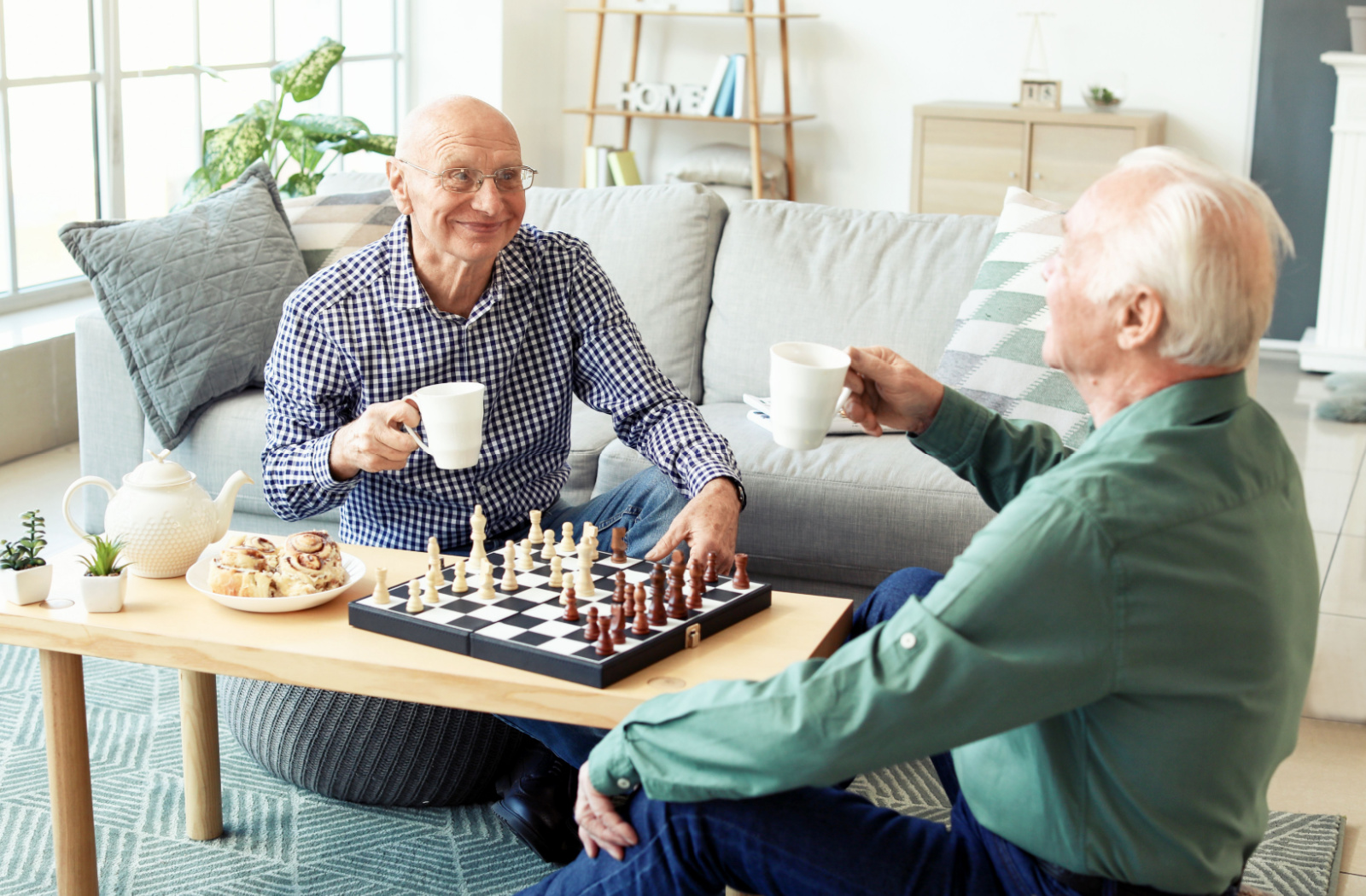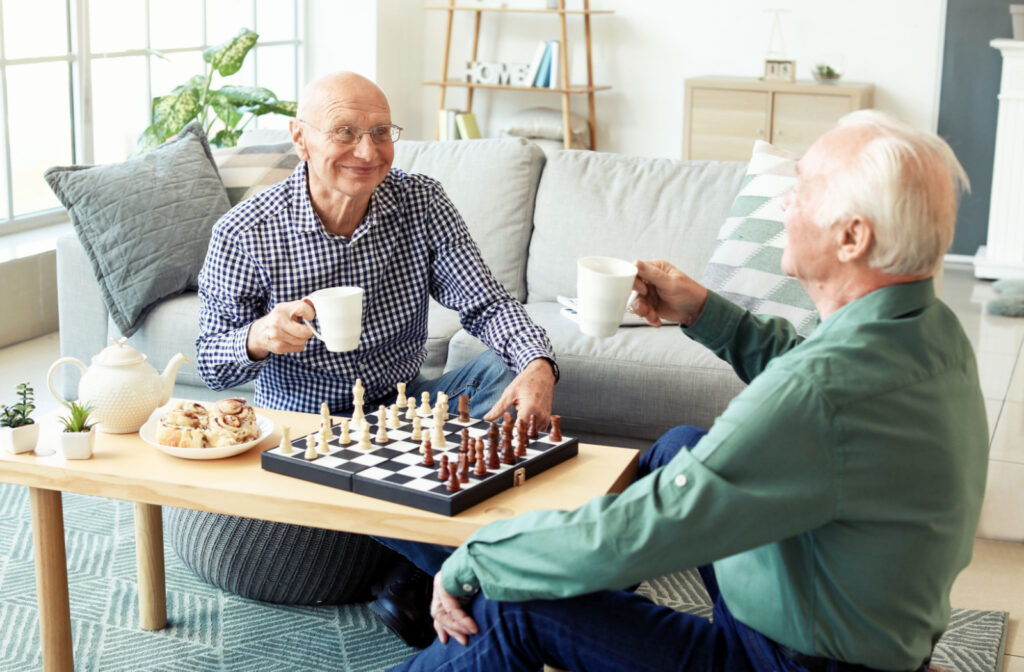Dementia can be a debilitating condition for seniors, so it’s important for older adults to stay engaged and active to maintain their quality of life for as long as possible. Some engaging games for seniors with dementia include trivia games, jigsaw puzzles, sorting games, reminiscing games, and card games.
Other engaging activities that can benefit someone with dementia are music and art therapy, staying physically active, and pet therapy. There isn’t a one-size-fits-all approach for a senior staying engaged with their life because it ultimately comes down to their preference for activities or games.
Choosing a senior community, like Urbana Place Senior Living, who offers memory care will typically mean there are qualified caregivers who have experience offering some of these activities to keep their resident’s minds and bodies engaged and thriving in the face of a dementia or Alzheimer’s diagnosis.
Engaging Games for Seniors with Dementia
Plenty of well-known games, such as Monopoly, Scrabble, or Jenga, are mass-produced and can provide a way for seniors with dementia to stay engaged. But it’s important to remember that even “homemade” games like counting or sorting buttons or making a game out of reminiscing over fond memories with a loved one can be beneficial.
Trivia games
Trivia games are an excellent choice for adults with dementia, as they can be tailored to their interests and abilities. You can create a personalized trivia game based on family history, favorite movies, or even current events. Additionally, trivia games can be played in groups, which can help facilitate social interaction and stimulate cognitive function.
Jigsaw puzzles
Jigsaw puzzles are another great option for individuals with dementia. They can help improve cognitive function, as well as hand-eye coordination and dexterity. Choose puzzles with larger pieces to avoid frustration, and consider working on the puzzle together as a bonding experience. Try jigsaw puzzles with unique shapes instead of the traditional square pieces for an extra challenge.
Sorting Games
Sorting games can help minimize distraction and focus the mind, making them particularly suitable for individuals with dementia. They may find comfort in sorting buttons by color, arranging playing cards by suit, or matching socks by pattern. These activities can help provide a sense of accomplishment, order, and calm.
Reminiscing Games
Reminiscing games are specially designed to encourage memory recall through discussions about their past. Encourage your loved one to share memories, photographs, or even artifacts from their life. These conversations promote social interaction and can be an excellent opportunity for your loved one to feel appreciated, listened to, and understood.
Card Games
Card games like Go Fish, Rummy, or Solitaire engage multiple cognitive functions. These simple yet challenging activities can help promote social interaction and mental sharpness. Additionally, card games offer a sense of familiarity as they have often been enjoyed for years. Make sure the cards are large and easy to read, and consider creating custom gameplay to keep things interesting and personal.

Other Engaging Activities for Seniors with Dementia
Not everyone will enjoy a card game or a puzzle. So, here are a few ideas for other engaging activities that may be beneficial for a senior.
Music Therapy
Music can be a powerful tool to connect with people of all ages and backgrounds, and music therapy is a widely used method for individuals with dementia. Music can evoke feelings of joy, nostalgia, and comfort that trigger positive memories and emotions. It can also help improve mood, reduce anxiety, and stimulate brain function.
Some activities you can try include singing together, playing an instrument, dancing, or listening to favorite songs or radio shows.
Art Therapy
Art therapy is another therapeutic activity that can benefit those with dementia. Art can provide an outlet for self-expression, creativity, and communication, which can help build confidence and reduce stress.
Art therapy may involve any type of art-making, including painting, drawing, collage, sculpture, and more. It can also be adapted to different ability levels, such as using larger or simpler tools or focusing on sensory qualities rather than technical skills.
Movement & Exercise
Physical exercise has been shown to improve not only bodily health, but can also improve cognitive function and mood. For individuals with dementia, movement can be especially important to maintain their mobility, balance, and independence. Some fun and gentle exercises include chair yoga, tai chi, stretching, or playing games with soft balls or balloons. You can also encourage walking outside, gardening, or dancing to upbeat music.
Pet Therapy
Interaction with animals has been shown to benefit individuals with dementia, including reducing agitated behavior, increasing socialization, and providing comfort and companionship. Pet therapy involves bringing trained animals, such as dogs or cats, to visit or live with individuals with dementia.
If this isn’t possible, you can also try virtual pet therapy, such as watching animal videos or using robotic pets. You can also incorporate pictures or stuffed animals into activities to evoke feelings of warmth and familiarity.
Staying Active & Engaged in a Senior Community
A significant benefit of a senior community, such as Urbana Place Senior Living, is the access to professional caregivers who have experienced and understand the importance of staying mentally and physically engaged in life—even in a person’s golden years. Call us at Urbana Place Senior Living to book a community tour. Come see what a Lifespark Community can offer you or your senior loved one.



